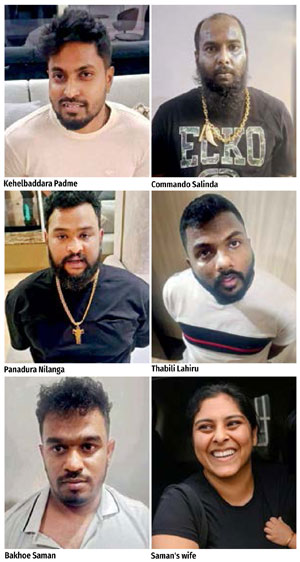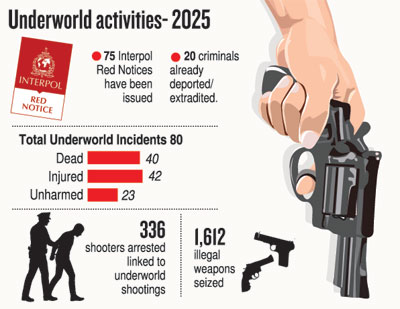News
Long arm of the law catching up with underworld
View(s):- Public Security Minister says organised crime kingpins arrested in Indonesia will be detained under PTA; dragnet launched for 67 fugitives evading arrest overseas
By Ishu Bandara
Public Security Minister Ananda Wijepala yesterday said the five notorious criminals arrested in Indonesia will be detained under the Prevention of Terrorism Act (PTA), enabling the authorities to obtain detention orders and question the suspects.
 The minister told the Sunday Times that although the government planned to repeal the PTA Act soon, the law would be used to detain and question hardcore criminals and crack down on organised crime until a new law was adopted.
The minister told the Sunday Times that although the government planned to repeal the PTA Act soon, the law would be used to detain and question hardcore criminals and crack down on organised crime until a new law was adopted.
He said the government was finalising a new Organised Crime Act to strengthen legal procedures, and the Justice Ministry was drafting a law that would allow authorities to detain and question organised criminals.
The minister said the five underworld figures arrested in Indonesia were expected to arrive in Sri Lanka yesterday. He also revealed that moves were underway to set up special courts to fast-track their cases.
He also revealed that all 67 wanted criminals living overseas and evading arrests were being tracked down with the help of Interpol.
While the kingpins were hunted down, others arrested on drug-related charges would be dealt with under a government policy that gives priority to rehabilitation over punitive measures. “Prisons are intended to serve as rehabilitation centres, but they currently fall short. Three new centres are planned in Batticaloa, Kurunegala, and Matara.”
The long-term goal is to establish around 25 centres, and Rs. 450 million has been allocated for it.
The minister said these centres would focus on drug addicts and provide a holistic approach with the involvement of counsellors, psychologists, and doctors. The programmes will be coordinated by the Commissioner General of Rehabilitation and the National Dangerous Drugs Control Board (NDDCB), which is already empowered under existing law to implement such rehabilitation initiatives.
At a news conference convened to announce the arrest of five Red-Noticed criminals in Indonesia, Mr. Wijepala emphasised that the law now applied equally to everyone, whether the suspect was a politician, a criminal, or an ordinary citizen, and affirmed that the judicial system was currently free from political interference.
The minister delivered a stern warning to criminals hiding abroad and those who had political protection, stating that “no one is above the law”. He blamed political patronage for the growth of the underworld and said, “Now the police have full independence to act.”
He thanked the Indonesian Metropolitan Police, the Government of Indonesia, Indian intelligence agencies, and the Sri Lankan Police, including the special team of the Criminal Investigation Division (CID), for their support in the seven-day operation. He also acknowledged partners in Malaysia, Thailand, Abu Dhabi, and India, as well as the Sri Lankan public for providing valuable information.
The other officials who attended the press conference were the Inspector General of Police (IGP) Priyantha Weerasuriya, Public Security Ministry Secretary Ravi Seneviratne, and Crime Record Division Director Ruwan Kumara. 
In what was described as the biggest coordinated operation overseas against Sri Lankan organised crime gangs, five most wanted underworld figures, Mandinu Padmasiri Perera, alias Kehelbaddara Padme; Commando Salinda; Panadura Nilanga; Lahiru Madushan, alias Thembili Lahiru; and Nirmala Sanjeewa, alias Backhoe Saman, were arrested in Jakarta, Indonesia, on August 28. They were scheduled to be brought to Sri Lanka yesterday, under strict security measures coordinated by both Indonesian and Sri Lankan authorities.
Backhoe Saman’s wife and child, who were briefly detained during the Jakarta raid, were released by the Indonesian authorities, as no serious criminal charges had been filed against them. They arrived in Sri Lanka on Friday.
According to police sources, the operation began three weeks before the arrests, with Senior DIG Asanka Karawita and Senior Superintendent Rohan Olugala of the Colombo North CID Division credited with mapping out the plan. The special team from Sri Lanka was physically on the ground in Jakarta, working under extremely challenging conditions.
Upon arrival at Bandaranaike International Airport, the suspects were expected to be taken to the Criminal Investigation Department (CID) headquarters in Peliyagoda for interrogation under the supervision of SSP Olugala.
CID investigators have already begun piecing together the clues to locate the multi-million-rupee assets allegedly belonging to the suspects. All five are linked to narcotics trafficking rings moving heroin and crystal meth (ice) across Sri Lanka, South Asia, and the Middle East. They are also involved in extortion rackets, contract killings, money laundering, and illegal arms deals. Police plan to present reports to the courts and seek prohibition orders to freeze these assets.
Police Spokesperson ASP F.U. Wootler told the Sunday Times that details of the cases were still being collected.
“We are gathering full information on warrants and charges, including murder, extortion, and drug-related offences. These are serious cases, but they must be properly documented with correct evidence for prosecution,” he said.
According to police sources, Kehelbaddara Padme (alias Mandinu Padmasiri Perera) is alleged to be the mastermind behind the courthouse assassination of Ganemulla Sanjeewa on February 19 this year. The victim was shot inside the Colombo Magistrate’s Court by assailants, one of whom was disguised as a lawyer. A suspected gunman was arrested the same day; several suspects were remanded. A key suspect was not identified at a parade held in June. Investigations are ongoing.
Kehelbaddara Padme is also linked to large-scale heroin and crystal meth (ice) trafficking. His close associate, Tilina “Walaskata” Sampath, was recently arrested for carrying heroin. Kehelbaddara Padme is also accused of laundering narcotics profits into movable and immovable assets, some registered under proxies and now targeted for freezing orders.
Commando Salintha is considered the co-mastermind of the Colombo courtroom murder on February 19. He has documented ties to narcotics networks and is under investigation for illicit assets in collaboration with Padme.
Backhoe Saman is a key suspect in the triple murder of Anura Vidanagamage (alias Middeniya Kajja) and his two children in Middeniya on February 18. The victims were shot while they were going on a motorcycle at Galpotthayaya–Kadawatta Junction, Middeniya. Police collected statements, including a confession from a hitman, and courts issued warrants for the masterminds and other linked suspects. Backhoe Saman’s wife and seven-year-old son were released later.
Thembili Lahiru is a co-suspect in the Middeniya triple murder alongside Backhoe Saman, and police had been hunting for him since then.
Panadura Nilanga is wanted for a series of shootings and murders in the Panadura region, with police intelligence detailing multiple incidents connected to factional rivalries, including conflicts with “Kudu Salindu”. His family members have also reportedly been targeted in revenge attacks.
When the Sunday Times asked senior lawyer Eshan Sadungahawatta for his comments on the arrests and the use of the PTA to detain the suspects, he said, “The arrested individuals are wanted for various criminal cases across Sri Lanka. Their cases will proceed under the Penal Code and Criminal Procedure Code. However, special regulations and other laws can be used by the CID to detain suspects for longer periods, potentially one to three months, without immediate production before a magistrate. Suspects can generally be detained for up to one year. After this period, if there is no strong evidence or if the High Court has not issued a specific order, bail may be considered. Magistrates do not have the power to grant bail for serious offences like murder; such decisions are made by the High Court.”
He emphasised that investigations must be completed fully before the case was brought to court, as incomplete investigations increased the likelihood of an offender being released.
Explaining the difference between the legal systems of Sri Lanka and other countries, including India, he said Sri Lanka follows an adversarial system, while the inquisitorial system, seen in Europe and India, focuses more on rehabilitation. He suggested that Sri Lanka’s adversarial system often emphasises punishment over rehabilitation.
Another senior lawyer who did not want to be named said that without strong evidence, suspects were held for a few days, granted bail, and then released. Citing bail laws, he emphasised that, regardless of the severity of the crime, suspects could generally be held for only one year. After this period, bail must be granted, even for those accused of multiple murders.
The lawyer highlighted the critical issue of witness reluctance, noting, “Even if cases are filed, rarely does a witness come forward.” He pointed out the lack of a robust witness protection programme leaves witnesses vulnerable. He also questioned the effectiveness of the new 2025 law allowing remote testimony, with courts still demanding the physical presence of the witness.
Referring to the Ganemulla Sanjeewa courtroom assassination, he noted that even the judge and lawyers who witnessed the shooting were unable to identify the killers, and this illustrates the dangers witnesses face.
Regarding the proposed special fast-track criminal courts, the lawyer warned that if witnesses refuse to identify criminals, cases could collapse, resulting in the release of offenders rather than merely expediting trials. He noted that specific High Courts already exist in Colombo to handle such cases.
The best way to say that you found the home of your dreams is by finding it on Hitad.lk. We have listings for apartments for sale or rent in Sri Lanka, no matter what locale you're looking for! Whether you live in Colombo, Galle, Kandy, Matara, Jaffna and more - we've got them all!

